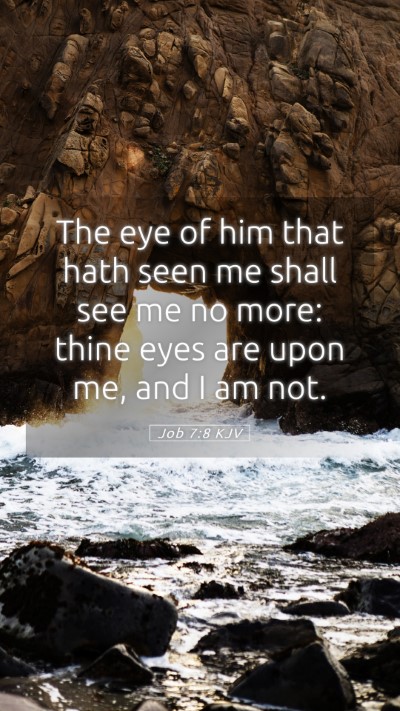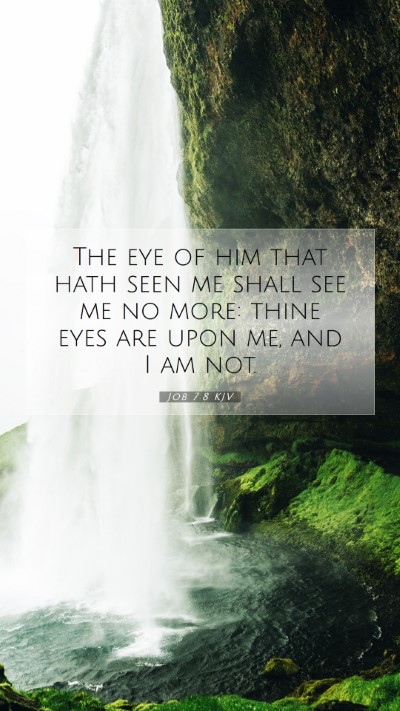Old Testament
Genesis Exodus Leviticus Numbers Deuteronomy Joshua Judges Ruth 1 Samuel 2 Samuel 1 Kings 2 Kings 1 Chronicles 2 Chronicles Ezra Nehemiah Esther Job Psalms Proverbs Ecclesiastes Song of Solomon Isaiah Jeremiah Lamentations Ezekiel Daniel Hosea Joel Amos Obadiah Jonah Micah Nahum Habakkuk Zephaniah Haggai Zechariah MalachiJob 7:8 Meaning
What is the meaning of Job 7:8?
The eye of him that hath seen me shall see me no more: thine eyes are upon me, and I am not.
Job 7:8 Bible Verse Meaning
Bible Verse Commentary on Job 7:8
Job 7:8: "The eye of him that hath seen me shall see me no more: thine eyes are upon me, and I am not." This verse captures a profound moment of despair and reflection in the life of Job, as he grapples with his suffering and the transient nature of human life.
Summary of Job 7:8
This verse reflects Job's realization of the loneliness and despair he feels amidst his suffering. He expressively states that those who had once witnessed his life and vitality would no longer see him in his current state of affliction. This speaks to a universal understanding of mortality and the fleeting nature of existence.
Bible Verse Meanings and Interpretations
- Mortality and Its Realization: Job's words highlight the human condition—the inevitability of death and the end of relationships. Albert Barnes notes that Job acknowledges the finality of death as a sobering reality.
- Despair in Suffering: Job is deeply aware of his plight, as Matthew Henry emphasizes. He feels unseen and unheard despite the recognition of his suffering. His lamentation reflects mankind's search for empathy in times of distress.
- Isolation in Affliction: Adam Clarke points out that Job feels abandoned; he senses that those who once paid him attention in his days of prosperity have turned away. This speaks to the broader experience many face when adversity strikes—feeling forsaken by those around them.
Understanding Scripture Through Historical Context
To interpret Job 7:8 accurately, one must consider the historical and literary context of the Book of Job. Written during a time when suffering was often attributed to divine punishment, Job's plight challenges this notion.
- Historical Context: Job's narrative is set in a patriarchal society where one's worth and divine favor were often assessed based on prosperity and health. Job's suffering flips this expectation on its head.
- Literary Framework: Job's poetic lament invites readers to ponder questions about justice, suffering, and faith, forming an essential part of the larger discourse about theodicy in the Bible.
Bible Study Insights and Applications
For those engaged in bible study or seeking to gain a deeper understanding of scripture, the insights from Job 7:8 are profound.
- Connecting with Others: Job's feelings of despair can resonate with individuals in bible study groups as they explore themes of suffering, faith, and hope.
- Using Bible Study Tools: To enhance understanding, utilize bible study tools that offer commentaries, dictionaries, and cross-references, enabling a richer exploration of Job's statements.
- Lessons on Empathy: The verse invites reflection on how we respond to the suffering of others and encourages discussions in bible study lessons about compassion and support during difficult times.
- Relevance Today: Job's lament is timeless and can guide believers through personal suffering, encouraging application in daily life through prayer, reflection, and community support.
Cross References Related to Job 7:8
- Psalms 39:13: "O spare me, that I may recover strength, before I go hence, and be no more." This verse echoes Job's desire for acknowledgment and relief from suffering.
- Ecclesiastes 3:20: "All go unto one place; all are of the dust, and all turn to dust again." This reflects the mortality theme present in Job's lament.
- Hebrews 9:27: "And as it is appointed unto men once to die, but after this the judgment." This New Testament echo reiterates the finality of life acknowledged by Job.
Conclusion
Job 7:8 remains a poignant testimony of human suffering and isolation, eliciting deep reflection on mortality and the nature of divine perception. As we engage in bible study and seek to understand such passages, we find that they not only inform our knowledge but also shape our hearts and responses to the world around us.


